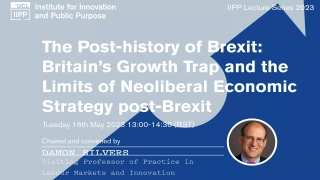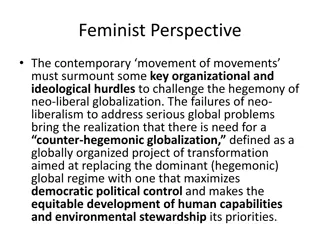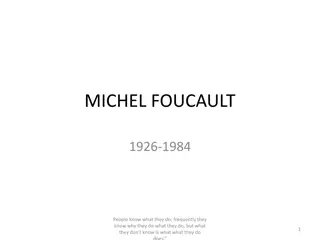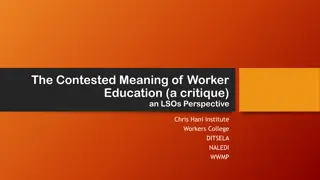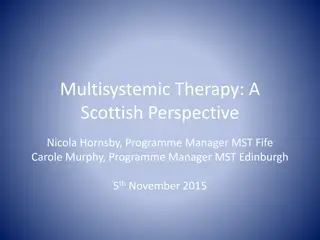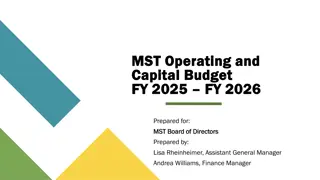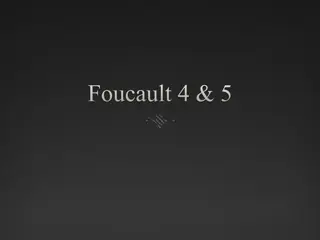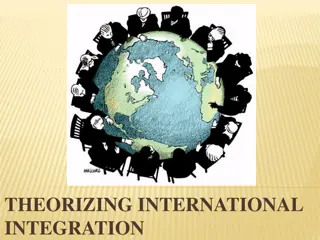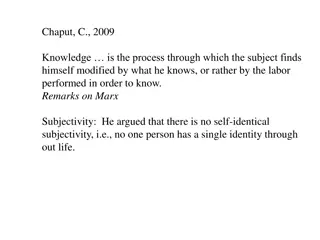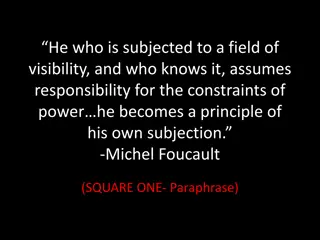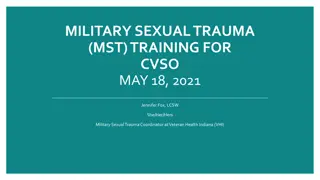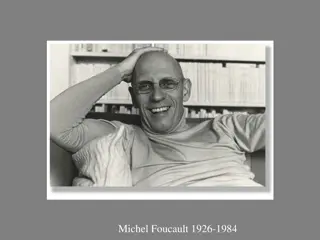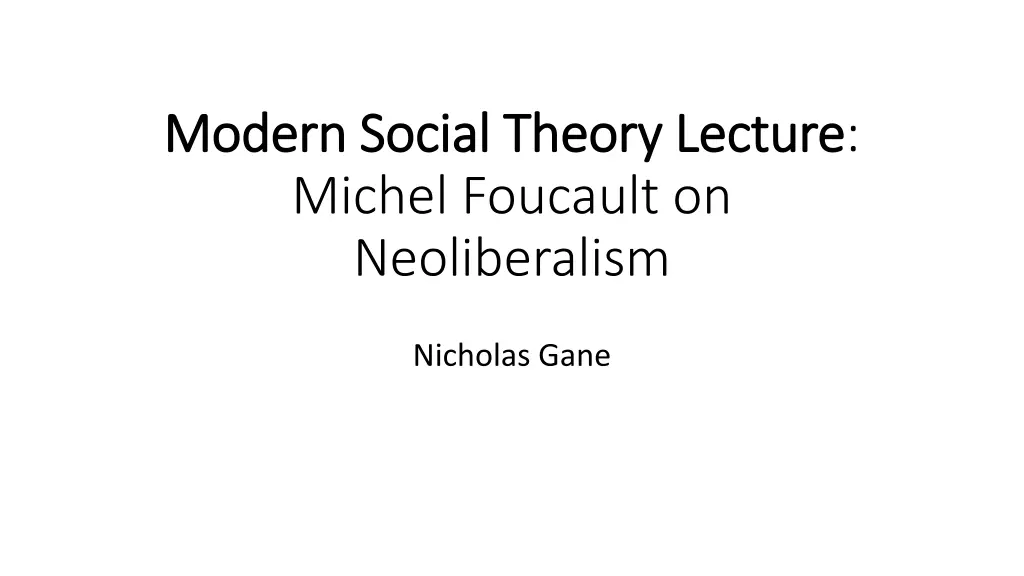
Michel Foucault on Neoliberalism and Biopolitics
Explore Michel Foucault's perspective on neoliberalism and biopolitics through his lecture series, "The Birth of Biopolitics," delivered at the College de France in 1978-9. Delve into Foucault's analysis of the shift towards market forces over the state and societal implications of neoliberal ideologies. Gain insights into the timing of these lectures amidst the rise of neoliberal politics and financial crises, shedding light on the responses of nation-states to these challenges.
Download Presentation

Please find below an Image/Link to download the presentation.
The content on the website is provided AS IS for your information and personal use only. It may not be sold, licensed, or shared on other websites without obtaining consent from the author. If you encounter any issues during the download, it is possible that the publisher has removed the file from their server.
You are allowed to download the files provided on this website for personal or commercial use, subject to the condition that they are used lawfully. All files are the property of their respective owners.
The content on the website is provided AS IS for your information and personal use only. It may not be sold, licensed, or shared on other websites without obtaining consent from the author.
E N D
Presentation Transcript
Modern Social Theory Lecture Modern Social Theory Lecture: Michel Foucault on Neoliberalism Nicholas Gane
Michel Foucault This week we are going to read the work of one of the most important social theorists of the 20th Century: Michel Foucault
Foucault Foucault lived from 1926-84 and his work addresses, among other things, power, sexuality, and emergence of modern institutions such as the prison His most famous books are Discipline and Punish (1975) and The History of Sexuality Volume 1 (1976)
Birth of Biopolitics It is likely that you will read these books on other modules, but the text we are going to focus on here is a series of lectures delivered at the College de France in the academic year 1978-9 This series is entitled The Birth of Biopolitics
The lecture series Almost every year from 1970 to 1984 (when he died), Foucault delivered a public lecture series at the College de France in Paris They tended to address a major book project he was working on, for example: truth, ethics, psychiatric power, sexuality But this lecture series is different as 1). It addresses the history of neoliberalism (there is no accompanying book project); and 2). While a history, it is mainly concerned with developments that took place through the second half of the 20thCentury
Neoliberalism and crisis The timing of these lectures is important as they were delivered (1978/9) just at the point that neoliberal politics became dominant on the ground (under Thatcher in the UK, and Reagan in the US) They were translated into English in 2008, again an important moment when the financial crisis took grip of the world In the period, the Lectures on Biopolitics became one of the most important texts for understanding the crisis and the ways in which the governments of different nation-states responded to it The main interest of this text: to explore the heightened powers of markets and competition over the state and perhaps all things social
The lectures The lectures are quite complex because they are not completely linear in narrative: they start with classical liberalism, consider different types of neoliberalism (German and American), and then go back to address classical notions of civil society They are lectures: written on a weekly basis and not completely polished They don t even speak to their title! But useful because they show that neoliberalism is not a recent invention and can take different forms in different places, ie more complex than understood by thinkers such as David Harvey
Ordoliberalism The main type of neoliberalism that we will study on this module is German neoliberalism that developed post-WW2 Foucault calls this the contemporary neo-liberalism which actually involves us (p.101). Foucault calls this form of neoliberalism ordoliberalism because it was pioneered by a group of economists based in Freiberg who contributed to a journal called Ordo; a journal that was founded by Walter Eucken in 1948 Foucault writes about ordoliberalism in three main chapters of his Lectures on Biopolitics
Some names from the lectures Lots of names from social science/economics that you probably won t recognise, but they were important during their day: Walter Eucken (1891-1950) and Alexander R stow (1885-1963): the main architects of German neoliberalism/ordoliberalism Wilhelm R pke (1899-1966): advisor to the Chancellor of West Germany post-WW2 and credited for the German economic miracle Alfred M ller-Armack (1901 1978): coined the term social market economy and Germany s representative at the Treaty of Rome in 1958 (which mapped out the future basis of the European Economic Community).
The detail of the lectures The lectures on ordoliberalism outline a series of changes in the relationship between states and markets One way of illustrating these change is to start with Foucault s lectures on classical liberalism, which is understood mainly through the work of Jeremy Bentham (1748-1832) Foucault s main point of interest in Bentham s work, particularly in Discipline and Punish, is his idea of the Panopticon This is a disciplinary model of surveillance in which everything can be seen and so the behaviour of those being watched is normalised
Key features Economical only needs a guard or two to watch over all the cell. Does there need even to be a guard in the watchtower? Only minimal intervention needed: people behave as if they are being watched Foucault: this is, in fact, the model of liberal, laissez-faire governance: Government, initially limited to the function of supervision, is only to intervene when it sees that something is not happening according to the general mechanics of behaviour, exchange and economic life panopticism really is a general political formula that characterises a type of government (p.67).
Neoliberalism So, the Panopticon is not just a prison architecture but a general political formula that characterises liberal forms of governance But why is this relevant to the study of neoliberalism? Under laissez-faire liberalism, government makes the free market possible and watches over it, only intervening if absolutely necessary Neoliberalism reverses this arrangement so that it is no longer government or the state at the centre of all things, but the market Put simply by Foucault: no longer is the state to ensure the legitimacy of the market, but rather the market is to produce legitimacy for the state, which in turn it to become its guarantor .
Germany Germany is particularly important in the emergence of this new arrangement because following WW2 and the horrors of national socialism, there was deep concern about the political powers of the state Foucault says that for the ordoliberals, one of the main lessons they drew from Nazism was that Essentially and above all it is the unlimited growth of state power (p.111). The problem, then, in post-War Germany was how to reform the state on different grounds, when there was already an existing, active market.
A marketised state? Foucault argues that, for the ordoliberals, the answer was to found a radically economic state , and to see state-formation as a commercial opening He writes: instead of accepting a free market defined by the state and kept as it were under state supervision which was, in a way, the initial formula of liberalism... the ordoliberals say we should completely turn the formula around and adopt the free market as organizing and regulating principle of the state, from the start of existence up to the last form of its interventions. In other words: a state under the supervision of the market rather than a market supervised by the state (p.116).
A new governmentality This is different from classical liberalism and ideas of laissez-faire: the market economy should be the principle of the state s internal regulation from start to finish of its existence and action (p.:116) So neoliberalism rests on a certain art or style of government or what Foucault calls governmentality: Government must accompany the market economy from start to finish. The market economy does not take something away from government. Rather, it indicates, it constitutes the general index in which one must place the rule for defining governmental action. One must govern for the market, rather than because of the market (p.121).
Markets and competition So the market and market dynamics start to be ever more important in contemporary (neoliberal) societies Are we living through a period characterised by the marketisation of the state and all things social? The main market dynamic identified by Foucault is competition, which is to play a regulatory role at every moment and every point in society , thereby promoting the general regulation of society by the market (2008:145). Is this the case? And what does Foucault mean by regulation through competition? Is this regulation enough?
Sociology Surprisingly the name of a famous sociologist appears at key points in Foucault s lectures: Max Weber He says that the Frankfurt School (Horkeimer, Adorno), which drew on the ideas of Marx and Weber to address questions of culture, can be contrasted to the ordoliberals in Freiburg, as both develop the work of Weber, although in quite different directions Foucault writes: [t]here is the same type of political experience and also the same starting point, since broadly speaking both schools started from a problematic...which was dominant in Germany at the start of the Twentieth Century and which we can call Weberianism (2008:105).
Neoliberalism vs Marxism Why Weber? Foucault points to an opposition between Marxist and neoliberal thought For Frankfurt School thinkers (Marx + Weber), the irrationality of capitalism is economic in basis and can be alleviated through an alternative social rationality (one not tied to the logic of the market) For the ordoliberals the reverse is the case: it is the social that is irrational and can only be fixed by defining, redefining, or rediscovering an underlying economic rationality, i.e. we should look to the market for answers.
Entrepreneurship and subjectivity A key part of neoliberalism is that the market and its logics start to infiltrate everything that is social. Foucault writes that, for the ordoliberals, there are no longer things that the market cannot touch, rather the problem becomes how you use the market to touch them (p.133). This includes the very basis of human subjectivity, which is defined increasingly through the values of enterprise and entrepreneurship (think of Dragon s Den ) Foucault says that what emerges is no longer just a supermarket (ie consumer) society but an enterprise society (p.147) Foucault: The homo economicus sought after is not the man [sic.] of exchange or man the consumer; he is the man of enterprise and production (p.147).
Finally: critique? It is worth thinking about the form of Foucault s lectures as you read them They are, for the most part, descriptive and map out different historical trajectories of neoliberalism Like the rest of his work, they aim to provide us with historical understandings of the present. Different to confronting neoliberal reason through, for example, an explicit Marxist critique. For some critics, this approach, which enhances our understanding of neoliberalism, is not critical enough What do you think?
Some questions to think about 1). Have all aspects of life become increasingly marketised in form? Can you give some examples? 2). Can/should competition play a role in the regulation of social and political institutions? 3). Are markets sites of an economic rationality that can be used to address social problems, or is the opposite the case? 4). Are there limits to markets things that they cannot or should not do? 5). Does neoliberalism create new forms of subjectivity: the competitive and enterprising subject? Can we find examples in popular culture? 6). Should Foucault be more critical of neoliberalism?

